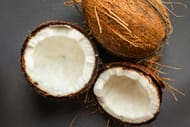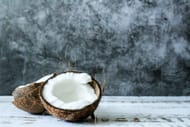The natural sweetener coconut sugar, sometimes referred to as coconut palm sugar or coconut crystals, is made from the sap of the coconut palm tree's flower buds. Coconut sugar is made into blocks or granules by extracting the sap, heating it, and drying it. Rich caramel flavor with a touch of butterscotch characterizes the finished product.
It is manufactured from the sap of the coconut palm tree and is distributed throughout Southeast Asia, including the Philippines. It's pretty much the same as jaggery and palm sugar, which are manufactured from sugar cane or palm sap.
Although it has only just become widely accessible in the UK, coconut palm sugar is becoming more and more well-liked, in part due to the increased demand for other coconut-based goods.
Is coconut sugar a healthy substitute?

To understand the answer to this question, let’s compare regular sugar with coconut sugar:
Nutritional profile
High fructose corn syrup and regular table sugar provide "empty" calories since they lack any essential elements.
However, a significant portion of the nutrients included in the coconut palm are still present in coconut palm sugar. These nutrients include minerals iron, zinc, calcium, and potassium as well as phytonutrients such as antioxidants and polyphenols.
Like conventional sugar, coconut palm sugar has high calories, so one would need to consume a ludicrous quantity of it to meet their needs for the aforementioned nutrients.
Glycemic index
The main advantage of coconut palm sugar over ordinary sugar is that it has a lower glycemic index. The glycemic index helps determine which foods will raise blood sugar levels the fastest, with 100 denoting pure glucose and zero denoting a food with no sugar at all.
Coconut sugar has a glycemic index of 54, which is lower than that of table sugar's 60, meaning it doesn't boost blood sugar levels as quickly.
GI, however, can range significantly between people and across batches of coconut palm sugar. It might also be influenced by the nutritional value of the other foods it is coupled with, the quantity and timing of meals, and other elements.
Potential risks associated with coconut sugar

Coconut palm sugar has little fiber, antioxidants or minerals, but it is high in calories. For the body to utilize these nutrients, one would have to consume so much coconut palm sugar that the calories would probably exceed the nutritious value.
Fruits naturally contain fructose, which is also included in coconut sugar. While fructose obtained naturally from whole fruits contains fiber and other healthy ingredients, consuming too much added fructose can lead to health problems such as fatty liver disease, insulin resistance, and elevated triglyceride levels.
Depending on how it is processed, coconut palm sugar might have different nutritional values. Certain coconut sugars that are sold commercially can go through a lot of processing, which would lower their nutritional value. Choosing less processed or polished kinds could be a wiser decision.
One can use coconut palm sugar in a thoughtful and balanced sugar intake strategy. It's vital to be mindful of its calorie level and utilize it sparingly even though it may be more beneficial than refined sugars. A qualified dietitian should be consulted for individualized guidance on any dietary decision made by someone with particular health issues or dietary limitations.
